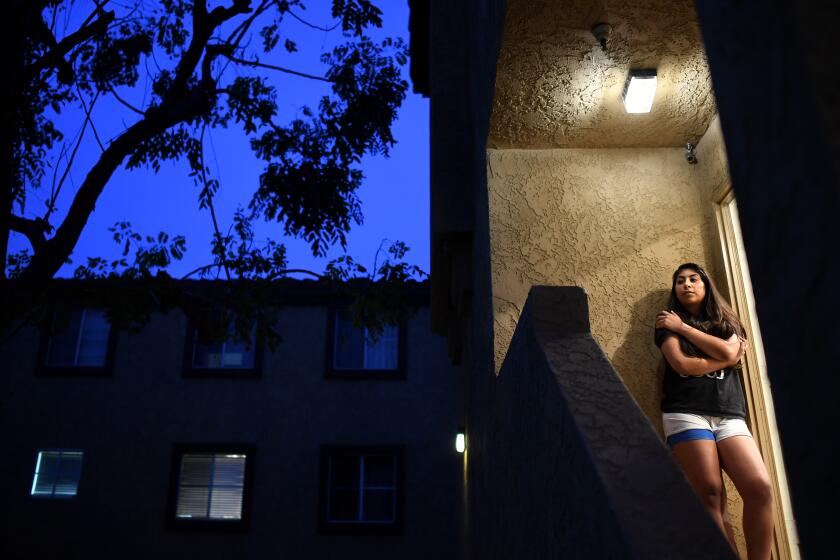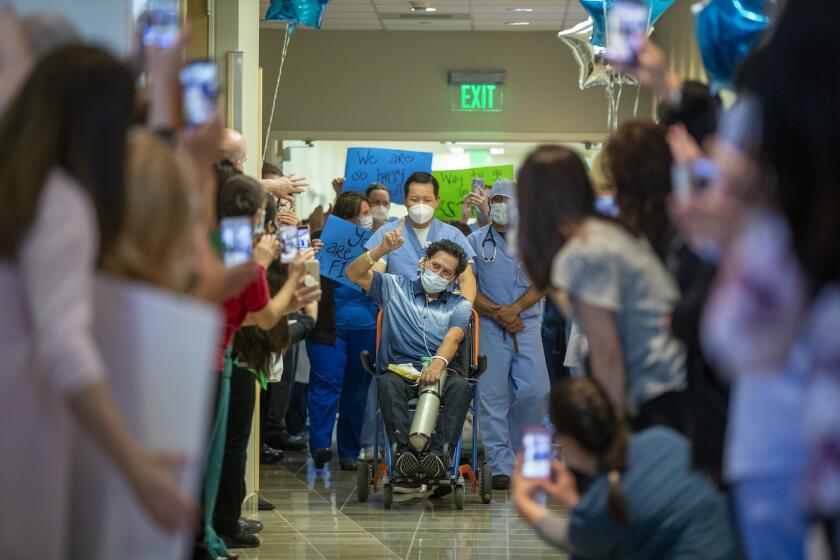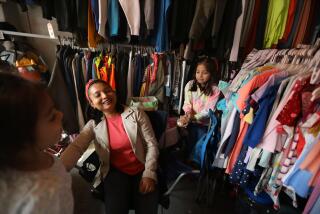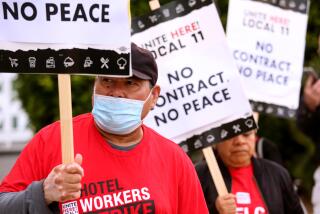It took her 20 years to claw out of poverty. Coronavirus could take it all away
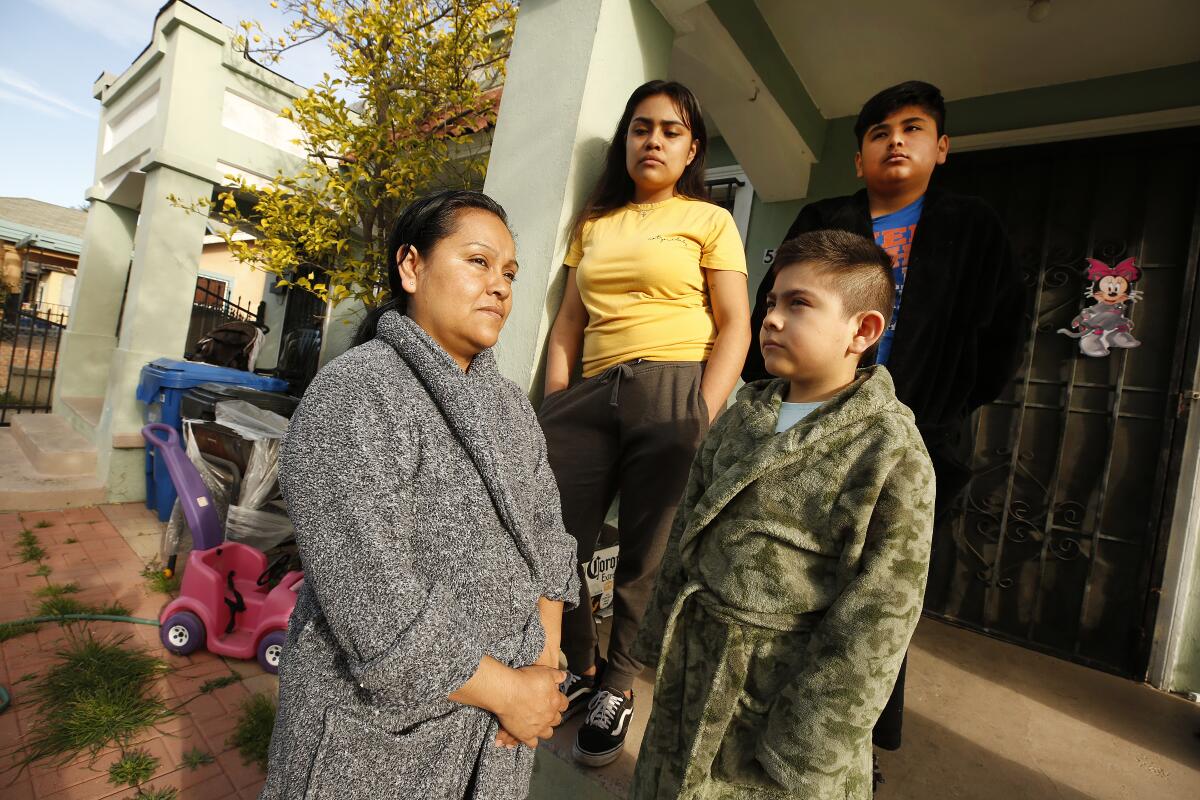
- Share via
Raquel Lezama had reason to be proud.
At 17, after crossing the Mexican border, she toiled in a Los Angeles garment factory, earning 5 cents for each blouse she ironed — $50 a day if she could manage 1,000 pieces.
A few years later, after surviving a brutal beating by her day-laborer husband, she gained legal residency through a green card reserved for victims of domestic violence.
And seven years ago, the single mother was hired at Mr. C Beverly Hills, a luxury hotel catering to Saudi princes, Japanese industrialists and European models. There she worked her way up from a minimum wage bed-making job to a position as a $17.76-an-hour minibar attendant — and helped organize fellow housekeepers into a union.
“We were like a family,” she said of her co-workers.
It had taken Lezama two decades to claw her way out of poverty. Then, in just a few minutes, she lost her way of life.
The 38-year-old is among more than 1.6 million Californians who are out of work as a result of the coronavirus pandemic. On March 13, the hotel laid her off, along with some 20 other housekeepers. The hotel canceled workers’ health insurance and sent them home with no severance. California’s lodging industry is one of the hardest hit as the economy all but shuts down; it is expected to shed some 125,000 jobs.
On Thursday, the U.S. Department of Labor reported that 878,727 Californians filed unemployment claims last week, more than double in any other state. Nationwide, jobless claims surged to a record 6.6 million, up from 3.3 million the prior week.
For those who can work at home or have savings to tide them over, COVID-19 can be a painful disruption for as long as it lasts. But for low-wage workers like Lezama, who speaks little English, it can amount to a catastrophe.
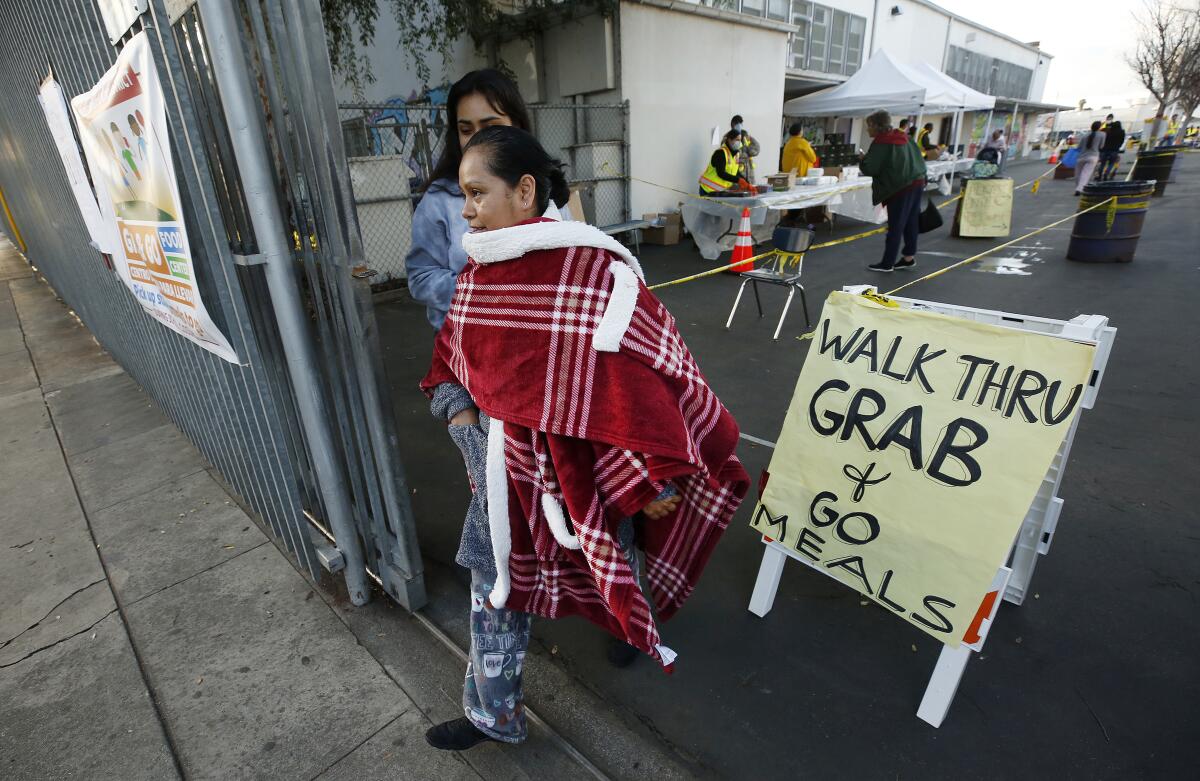
How does the other half live in the age of the coronavirus? Lezama’s struggle over the past three weeks is a lesson in survival — in how one modest family, led by one tenacious woman, copes at a time when the nation’s threadbare safety net has come into sharp relief.
On the day Lezama lost her job, President Trump declared the COVID-19 outbreak a national emergency. Meanwhile, at the cramped South Los Angeles home she shares with her three children, “I went into my bedroom and closed the door,” she said. “I didn’t want my kids to see me crying.”
That afternoon, there was more bad news: The Los Angeles Unified School District announced it would shut down, leaving her sons — 13-year-old Alan, who has a learning disability, and 8-year-old Jesus, who suffers from chronic colitis — at home with little means of keeping up their education.
Coronavirus unemployment hits a broad swath of industries across California.
A few days before, her 19-year-old daughter, Monica, had moved back home from Riverside County, her hopes dashed of finding a job there and studying to be a dental assistant.
By Monday at 9 a.m., Lezama was standing in line with several hundred others on Alvarado Street, where the hotel workers union, Unite Here, was helping members apply for unemployment benefits. But the state’s website kept crashing, and, after five hours, she left without succeeding. She had to get to a pharmacy to pick up medicine for Jesus.
That night, after three hours on the secondhand computer she had bought on an installment plan just a year ago, Lezama was finally able to file her application. It would be 10 days before she got a response saying she qualifies for the state’s maximum of $450 a week — less than two-thirds of her base pay at the hotel.
But when would the money come? She still doesn’t know.
Meanwhile, with no savings, how would she feed the children? How would she pay the monthly rent of $1,400 on her half of the small lime-green duplex off South Figueroa Street, due next week? The landlord charges $10 for every late day and was not offering any relief.
And what about the $300 monthly loan on her 13-year-old Honda Accord? Or her $140 monthly car insurance bill? The gas bill? The electric bill?
Should she cancel the $35 monthly Wi-Fi? But then her son Alan could not access his school’s promised distance learning.
“I need to sit down and figure out what to cut,” she said in an interview, sitting on a park bench near her home. “I just want to keep my little family together.”
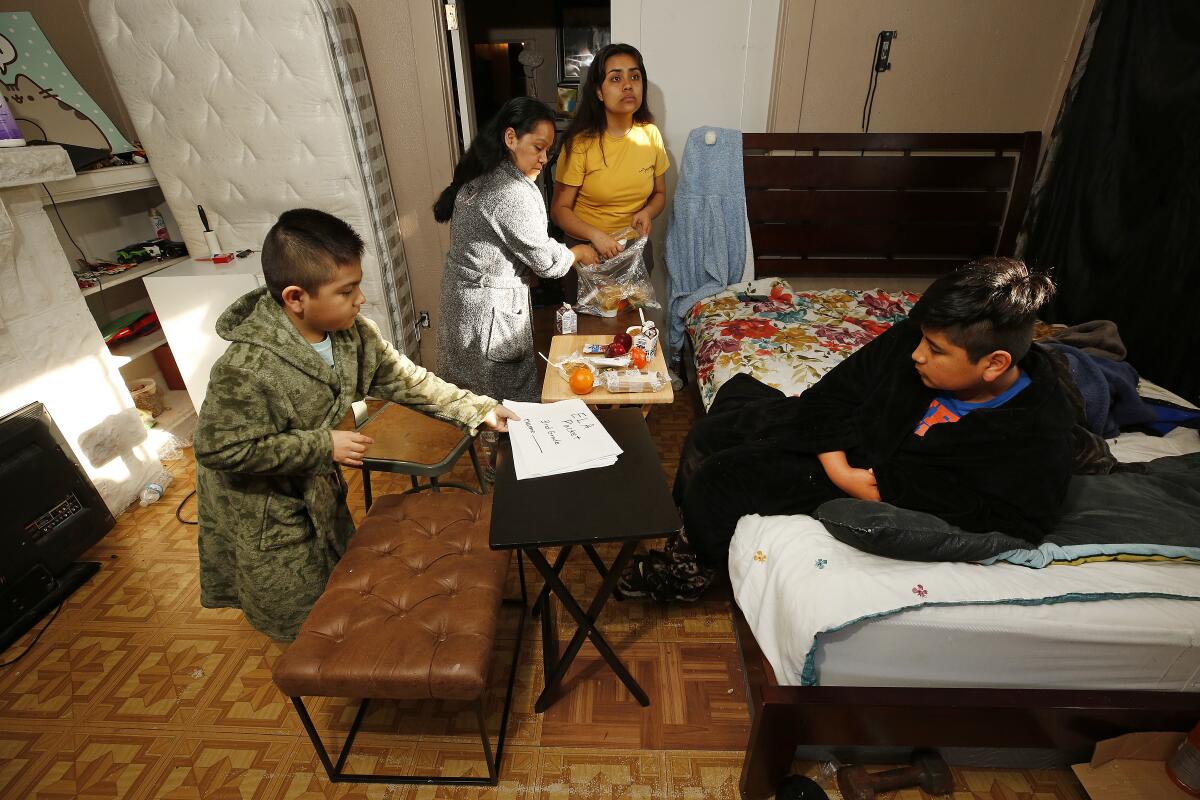
At night, Lezama wakes up and can’t go back to sleep, another worry on her mind: The life insurance policy she had been contributing to each week disappeared with her paycheck. “I had told my kids this was very important if something happens to me,” she said. “Now, if I die, will they even have money to bury me?”
Two weeks after Lezama was laid off, Congress passed a $2-trillion federal relief package, which includes a one-time $1,200 cash payment for Americans who make less than $75,000, plus $500 for each dependent child. The law’s supplemental unemployment insurance — $600 a week for four months — could also make Lezama whole for a time.
But the money could take weeks to come, and what happens when it runs out? Meanwhile, bills are due.
Early on a chilly morning, mother and daughter walked the six blocks from their home, down streets with little stucco bungalows, across a playground with a mural reading “Be Kind,” past a shuttered boxing gym and a Pentecostal church to the grab-and-go food center at Manual Arts High School.
The two plastic bags they collected would replace a day’s free breakfast and lunch that the school district offers to low-income families.
Back home, Lezama set up three tray tables and laid out the chocolate milk, burritos, apples, oranges, cheese and cookies. The boys sat on Monica’s bed, which takes up half the space in the small living room.
These are some of the unusual new scenes across the Southland during the coronavirus outbreak.
Alan was a study in gloom, his head down, his shoulders rounded, his voice barely registering above a whisper. He missed his school friends, he said, and was spending a lot of time playing Fortnite.
Jesus sprang up with a grin, showing off the packet of homework his mother had picked up from school. He cuddled his pet rabbit and said he was doing more chores because of a card game they had made up.
“Whoever loses must wash the dishes,” he said.
The boys stay indoors, fearing that venturing outside could expose them to the virus. They do jumping jacks and push-ups. They play Monopoly and chess.
Monica tries to help with homework, navigating the schools’ confusing websites.
“It’s hard,” she said. “Sometimes the Wi-Fi cuts out. Sometimes Alan’s teacher doesn’t email him back. And when I don’t understand fractions either, he gets frustrated.”
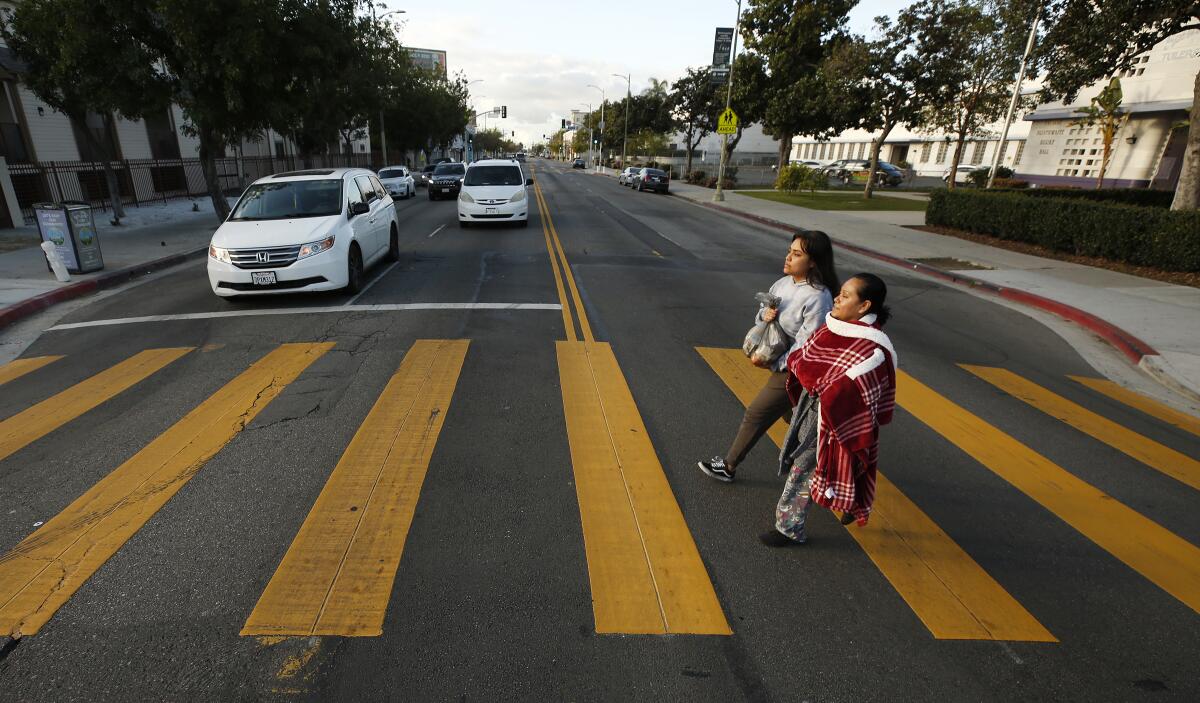
Monica has her own troubles. She had quit a job at an L.A. Jack in the Box out of fear: Customers made death threats when orders were not to their liking. Her Riverside move was an effort “to find calm and less violence, but it didn’t turn out so good and now I feel useless,” she said. “I can’t help my mom with the rent and the bills. It’s really hard to find a job.”
Lezama hasn’t applied for a new job, partly because she is in constant pain. Last June, a co-worker opened a door, inadvertently pushing Lezama’s heavy minibar cart and causing her to fall. A workers’ comp doctor gave her medication, but injuries to her neck, shoulder and hand have failed to heal. She goes to physical therapy and acupuncture three times a week.
“But I never missed work,” she said.
Now, along with her job, the coronavirus has stolen Lezama’s pride. As a garment worker, she got food stamps. But she swore that if she ever got legal documents, “I would never depend on the government again,” she said. “We never lived in luxury. But I earned enough to cover our expenses.”
Since her layoff, Lezama’s days are a whirl of caring for her children, negotiating to delay her bills, rushing out to union food banks and school lunch handouts, picking up homework for Jesus, and driving to physical therapy.
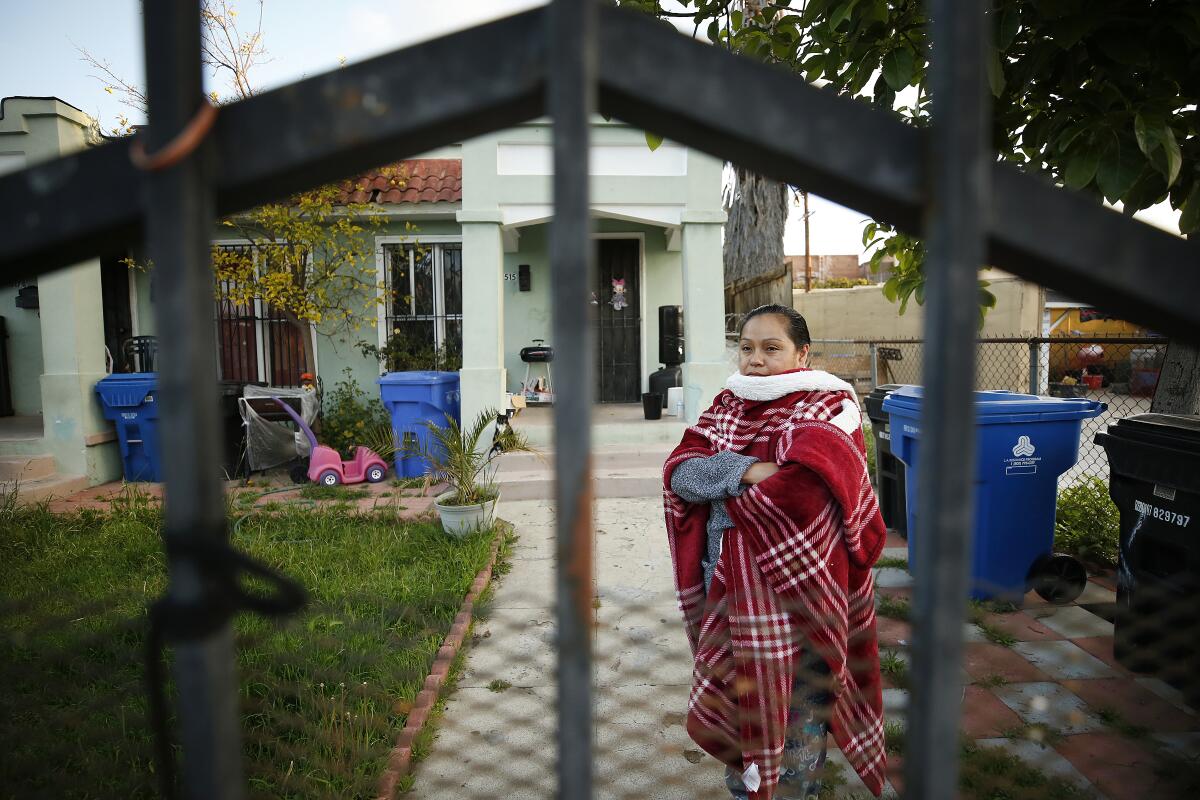
She doesn’t watch the news.
“It is too depressing,” she said. “It makes me sad not to be able to help.”
Three years ago, when an earthquake hit her hometown of Puebla, “I cried,” she said. “So many deaths. I collected clothing and sent big boxes of supplies.”
She wishes she could help her co-workers who call to commiserate. One is terrified she will be billed more than $1,000 for a colonoscopy after finding out the hotel had terminated workers’ health insurance plan. Another, an undocumented mother of five, used a fake Social Security number to work and will not be able to collect unemployment benefits.
The housekeepers at Mr. C were expected to be discreet, Lezama said, making a little zipping motion across her mouth. But now she freely describes the guests she served: the Saudi prince who came with five wives and insisted that “no one look at his face”; Luis Miguel, the Mexican crooner, who stayed three months, dodging paparazzi; and the Japanese executive from the company that marketed Hello Kitty, who died of a heart attack in his room.
Mr. C, developed by Los Angeles investors Bob and Alex Ghassemieh, boasts Venetian chandeliers, marble bathrooms, poolside cabanas and affiliation with Europe’s Cipriani hotel empire. It also was the site of an alleged 2013 sexual assault by Harvey Weinstein against an Italian model — a charge that figured in his New York trial and is now pending in Los Angeles criminal court.
Bob Ghassemieh, reached by phone, declined to comment on Mr. C’s layoffs.
Lezama can’t help thinking about the contrast between the luxury that surrounded her at Mr. C’s and the circumstances of her dismissal.
“I tried to stay calm,” she recalled. “I didn’t talk back. I gave them my key and my uniform.”
The manager, she said, told her that the layoff was temporary and that she could apply for unemployment benefits. But later, when she picked up her final check, she was told her termination was final, and if the hotel recovered in the future, she could re-apply but would have no seniority.
“I will have to start at minimum wage again,” she said. “That’s what gets to me.”
More to Read
Inside the business of entertainment
The Wide Shot brings you news, analysis and insights on everything from streaming wars to production — and what it all means for the future.
You may occasionally receive promotional content from the Los Angeles Times.

